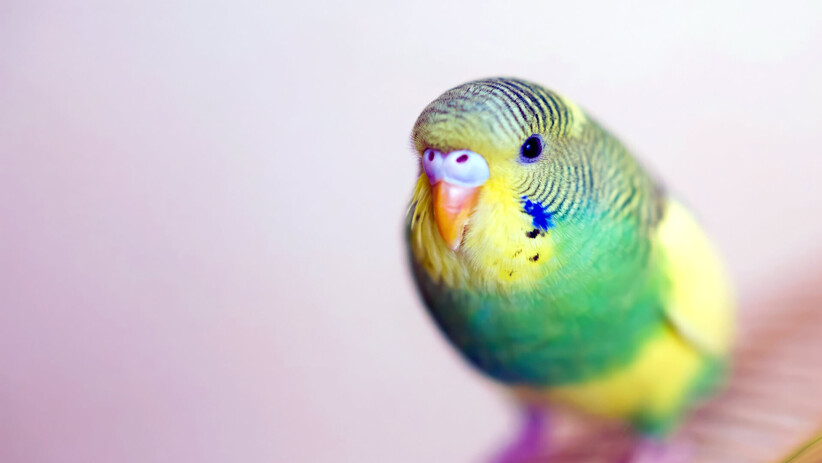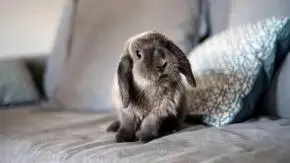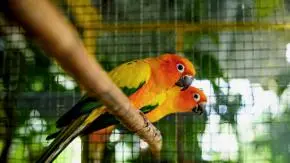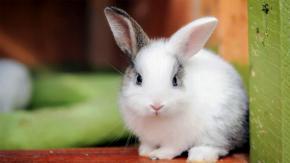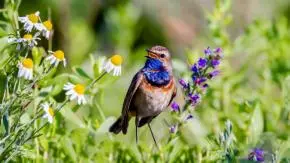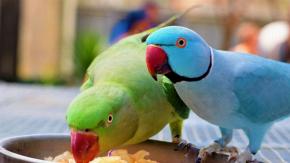Polly wasn’t interested in crackers. No, Polly, a mischievous blue-crowned conure, had a far more daring plan.
As her owner brewed a morning cup of coffee, Polly navigated the precarious landscape of the countertop with a gymnast’s grace. Her target? A glistening metal knob – the perfect chewing challenge.
Luckily, disaster was averted this time. But Polly’s insatiable curiosity and playful beak remind us that parrots, while undeniably intelligent and entertaining companions, are delicate creatures in our homes.
Parrots bring joy to countless households with their vibrant personalities and knack for mimicking sounds. However, their natural curiosity can quickly turn dangerous within the confines of a human dwelling.
A parrot’s world is filled with hidden hazards, from electrical wires to seemingly harmless houseplants.
This is where “parrot-proofing” comes in – a crucial step in creating a safe and enriching environment for your feathered friend.
By taking some preventative measures, you can transform your home from a minefield of dangers into a playground of exploration and happiness for your beloved parrot.
Common Household Hazards for Parrots
Parrots are curious and intelligent creatures, but their inquisitiveness can lead them into trouble. Many seemingly harmless household items pose a significant risk to their health.
Here’s a look at some common dangers in your home and how to keep your feathered companion safe.
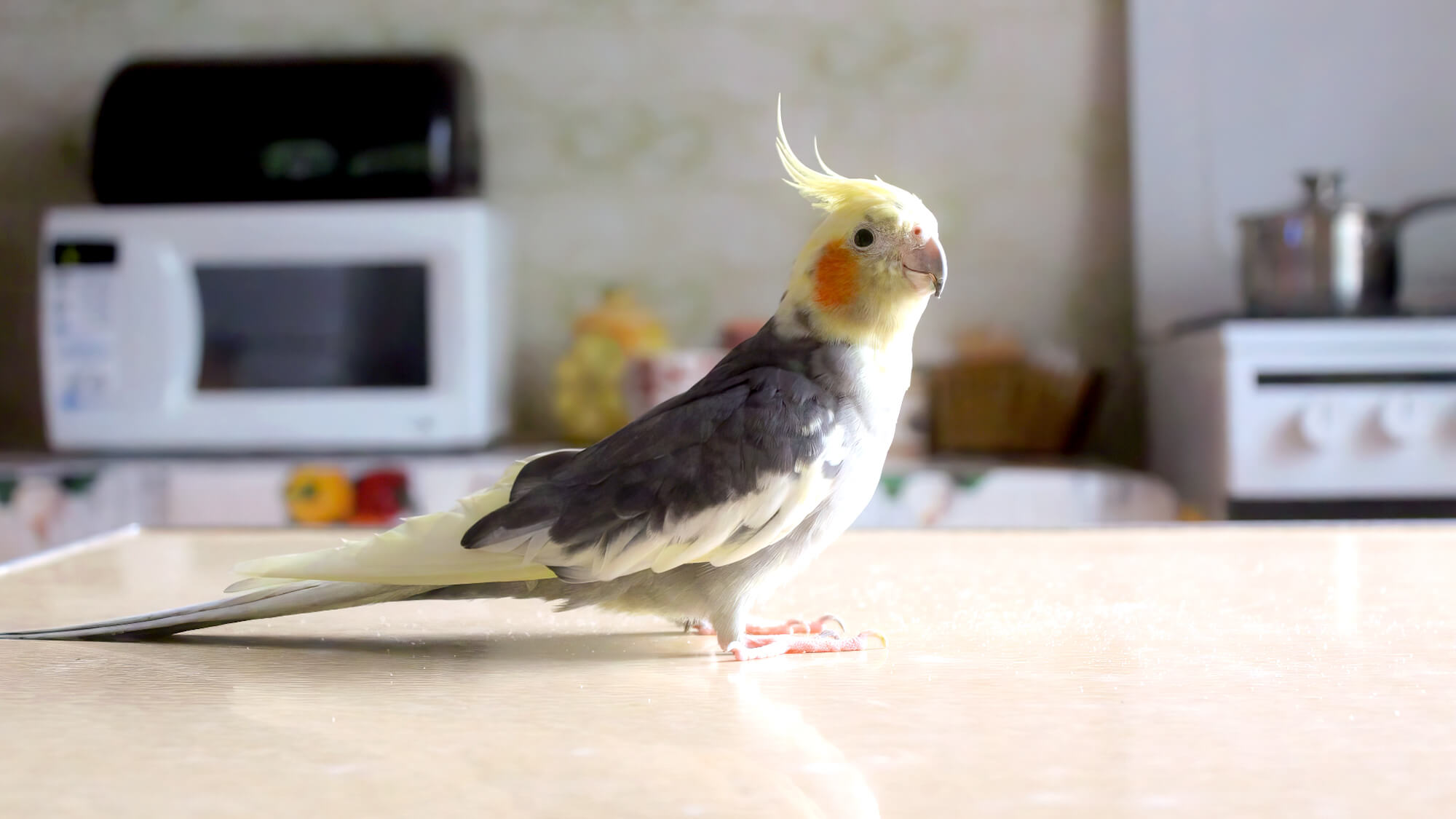
Kitchen Capers
- Hot Stuff: Kitchens are bustling with potential hazards. Keep your parrot away from hot surfaces like stovetops, ovens, and toasters. Their delicate feet can be easily burned.
- Open Flames: Open flames from candles or gas stoves are a major fire risk and can singe your parrot’s feathers. Keep them out of reach.
- Uncovered Cookware: Uncovered pots and pans containing boiling water or hot oil pose a scalding threat.
- Toxic Treats: Many foods we enjoy are poisonous to parrots. Chocolate, avocado, onions, and garlic are just a few examples. Be mindful of dropped food scraps and store all food securely.
- Trash Talk: Garbage bins are a treasure trove for curious parrots, but they can contain harmful food scraps, mouldy items, and sharp objects. Keep bins securely closed with lids.
Living Room Larking
- Electric Avenue: Electrical cords, wires, and exposed outlets are a shocking hazard. Chewing on them can lead to electrocution. Cover cords with protectors or keep them out of reach.
- Plant Problems:Many houseplants are toxic to parrots. Research your plants and remove any that could be harmful.
- Cleaning Concerns: The harsh chemicals in cleaning products can irritate your parrot’s respiratory system. Store them securely and ensure proper ventilation when cleaning.
- Medicine Mishap: Human medications can be lethal in small doses for parrots. Keep all medicines out of reach and in secure cabinets.
- Playtime Perils: While playtime is essential, supervision is crucial. A curious parrot can quickly get into trouble – chewing on furniture, ingesting small objects, or injuring themselves on decorations.
Bathroom Blues
- Toilet Troubles: Toilets are a drowning hazard for parrots. Keep the lid closed, and consider using a latch to prevent access.
- Tub Time: Bathtubs filled with water pose a drowning risk for even strong swimmers. Never leave your parrot unattended near a bathtub.
- Toxic Toiletries: If ingested, Shampoos, soaps, and other toiletries can be harmful. Keep them out of reach in closed cabinets.
- Closed Door Policy: Keeping the bathroom door closed when not in use adds extra safety for your parrot.
Bedroom Brawls
- Fabric Frenzy: Loose fabrics like curtains and bedding can be a strangulation hazard for parrots who like to climb and chew. Secure loose ends and consider trimming long curtains.
- Jewellery Jitters: Rings, necklaces, and other small jewellery pieces can be choking hazards for parrots. Keep them out of reach or stored in secure containers.
- Sewing Supplies: Button, pin, and needles are potential ingestion hazards. When not in use, store sewing supplies in closed containers or drawers.
- Closed Door Policy: Similar to the bathroom, keeping the bedroom door closed when not in use helps prevent unsupervised exploration and potential dangers.
Being aware of these common household hazards and taking preventative measures can create a safe and healthy environment for your feathered friend. Remember, vigilance goes a long way in keeping your parrot happy and healthy for years.
Creating a Parrot Paradise: Safe & Stimulating Environment
Here’s how to create a parrot paradise that’s both safe and stimulating for your feathered friend.
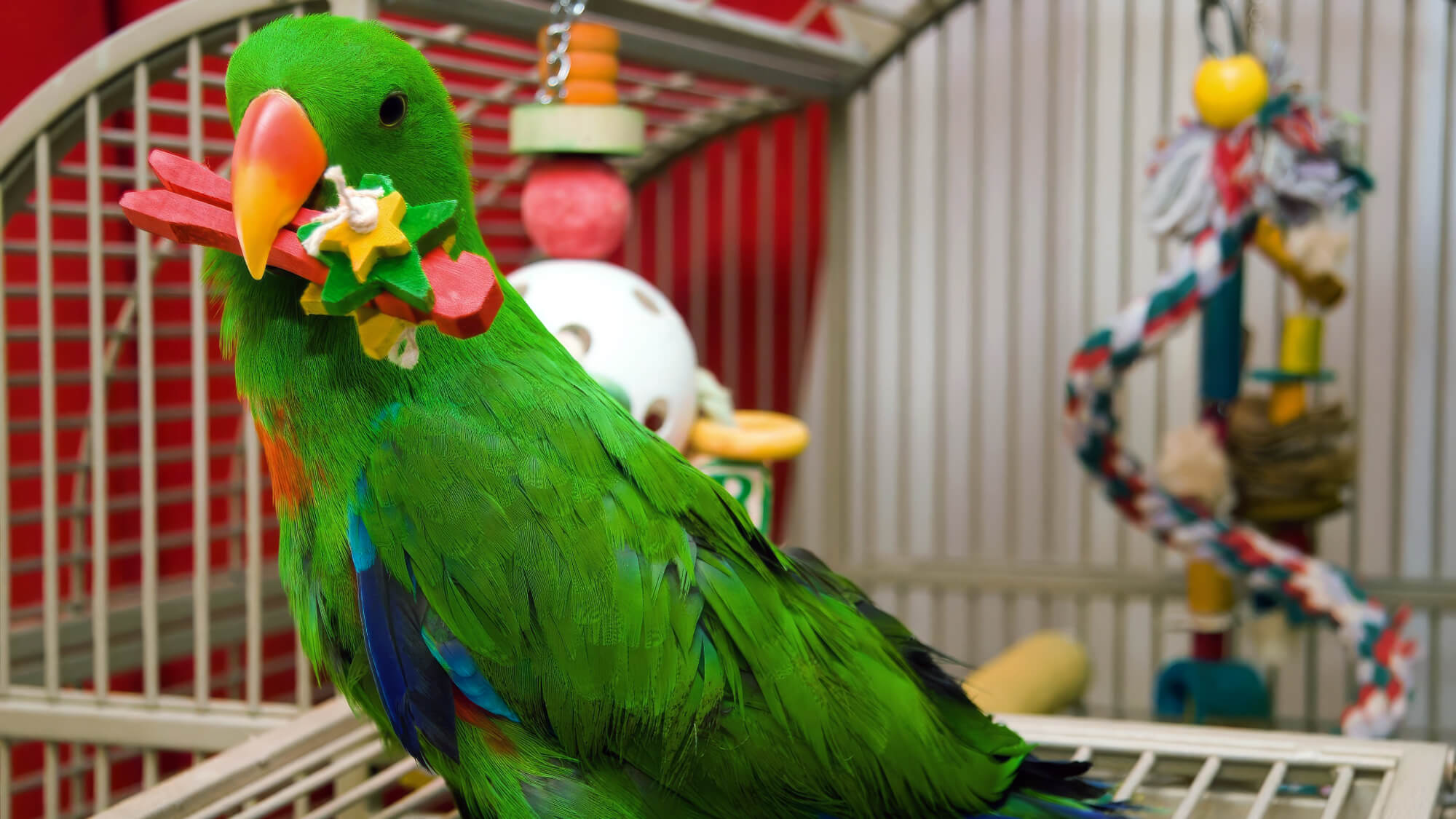
Bird-Safe Materials
A parrot’s world is explored primarily through their beak.
Perches, toys, and playstands should be made from natural, untreated materials like bird-safe wood, sisal, and cotton rope. Avoid anything with treated wood, as the chemicals can be toxic.
Similarly, steer clear of lead-based paints, which can cause lead poisoning if ingested.
The Importance of Supervision
Never underestimate a parrot’s curiosity and potential for mischief. Constant supervision, especially during the out-of-cage time, is crucial. This allows you to intervene if they encounter something dangerous or destructive.
Parrot training based on positive reinforcement can help establish boundaries and teach them appropriate behaviours.
Enrichment & Entertainment
Boredom can lead to destructive behaviours in parrots. Providing various stimulating toys and activities is key to keeping them mentally engaged. Foraging toys that require them to work for a treat mimic natural foraging behaviours and provide mental stimulation.
Shreddable materials like paper towel rolls or cardboard boxes satisfy their chewing instinct and provide a creative outlet.
Climbing structures like rope perches and play gyms encourage exercise and mimic their natural habitat. Rotate toys regularly to keep things fresh and prevent boredom.
Creating a safe and stimulating environment will ensure your parrot thrives and strengthens your bond.
Additional Tips for Parrot Safety
Here are some additional parrot safety tips:
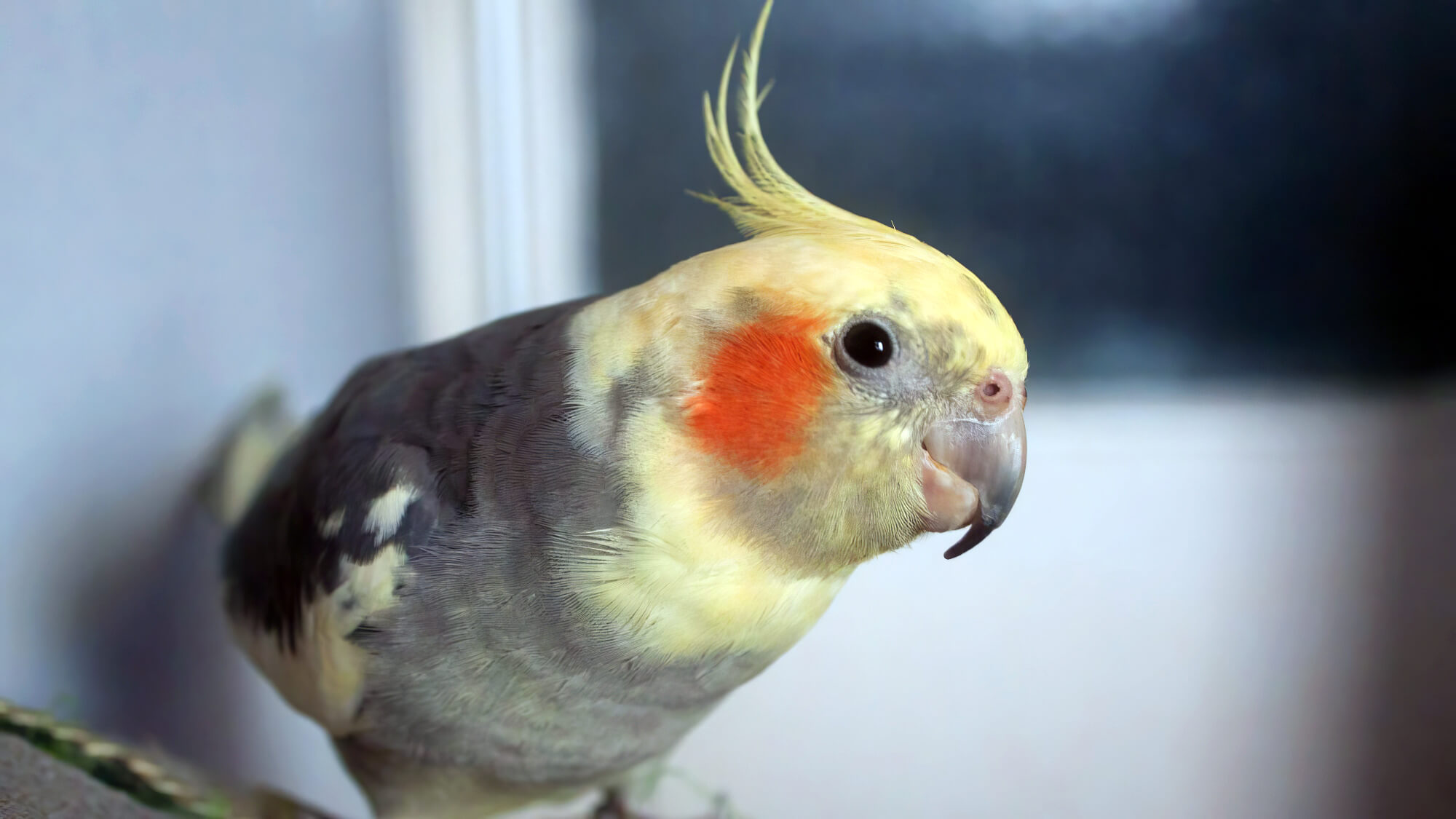
Regular veterinary checkups
Parrots need regular checkups with an avian vet, like any pet, to ensure their health and well-being. These checkups can help identify potential problems when they’re often easier to treat.
Microchipping
Consider microchipping your parrot. This tiny chip, implanted under your bird’s skin, stores identification information that can be scanned by a veterinarian or animal shelter if your parrot ever escapes.
A microchip can significantly increase the chances of your feathered friend being safely returned.
Emergency vet contact information
Keep the contact information for a nearby emergency veterinarian readily available in case of unexpected illness or injury. This will save you precious time in getting your parrot the care they need.
Soar High with Confidence: A Happy & Healthy Parrot
Providing a safe and stimulating environment is vital for your parrot’s well-being. It keeps them mentally sharp and physically active and helps prevent boredom-related issues.
Imagine a happy, playful parrot shredding a new toy or excitedly foraging for hidden treats – that’s the joy of responsible parrot ownership!
At Planet Pet, Australia’s trusted source for all things bird, we understand your feathered friend’s needs.
We offer various safe toys, perches, and enrichment items to keep your feathered companion entertained and thriving.
With our commitment to high-quality products and expert advice, Planet Pet is here to help you create a happy and healthy life for your beloved parrot. Call us today!

